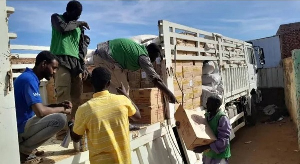Ahiable Ghana's major ice cream maker, Fan Milk Limited, has become the first casualty of the economic turmoil that is eating up the fortunes of industries vulnerable to foreign exchange fluctuations.
The company made a loss of ?2.3 billion in the first half of the year and played against time to recover from the shock but the further down turn of the economy has badly affected its operations. Fan Milk could have avoided the problems it is now facing if it had established production units in Ghana to supply raw material for its ice cream business. The company imports almost all its inputs for its range of dairy products.
Apart from water and vegetable oil that are sourced locally, the company imports milk powder, sugar, flavour, preservatives, and packaging materials. These inputs have become more expensive because of the fall in the value of the cedi but the price of ice cream could not be increased having reached its peak point. Ghanaians are not ready to pay more for ice cream because it is not considered an essential commodity. As economists term it, demand has been stretched beyond its elasticity. The management of the company was faced with a dilemma to keep its operations at a range that would minimise losses. Since the price of ice cream could not be increased, further it had to cut down its output and lay off some of its workers to save costs and administrative expenses until the economic situation improves. The workforce at the production unit was trimmed to a smaller size in a redundancy exercise that affected 120 workers, almost a quarter of the workforce.
Most of the affected workers are skilled labour that is trained specially to meet the needs of the company. Since the affected workers are not likely to be absorbed into other industrial establishments, they simply have to wait until the economy improves. However, there are fears that the affected workers may be forced to work for conditions unacceptable to them because they would have a limited choice to make. Fan Milk has virtual monopoly in ice cream production in the country and controls about 98% of the market. The company has in the past, used its monopoly power to engage in ruthless trade practices that crippled its competitors through major district and retail outlets. For instance Fan Milk provides deep freezers to retailers of ice cream and as part of the conditions, retailers who use the company's freezers are supposed to sell Fan Milk products only.
Many retailers cannot afford a refrigerator and have to succumb to the demand. This gives the company full control over retail sales of ice cream. Notwithstanding the field day the company was enjoying, it failed to ensure its own local raw material inputs to produce powdered milk, the main ingredient for its products. Nothing stopped Fan Milk from establishing a dairy farm to supply milk for ice cream, yogurt and butter. The company's current business practice is a template designed on a colonial model that depends on raw materials import from Denmark. The Danes in colonial times came in as trading partners and established trading posts in some coastal towns. Most of their businesses were established with the aim of importing raw materials from Denmark to feed them. Another classic example today is Deng a company that primarily imports items, assembles and sells them in the Ghanaian market.
In reality, all foreign loans are fashioned on the same model and most of the Ghanaian companies that enter such partnerships soon find out that they have to import capital goods and raw materials from abroad at exorbitant prices even if substitutes can be sourced locally. Technical support is also available in foreign currency as part of the tied funding. Classic examples of these are the US Exim bank, Germany's GZT, British ODA, Japan's JICA, and Canadian ODA programmes. The DANIDA Private Enterprise Programme of which Ghana is one of the six African countries singled out for support has so far been very slow to yield a solid business partnership with Ghanaian control. Fan Milk as an example is run by Mr. J. B. Jepersen a Dane and DENG, another well known Danish company, is also run by Mr. Fred Bosteen also a Dane. Fan Milk as a case in point, is owned 39% by the public, 36% by Fan Milk International A/S, Denmark and 25% by the IFU (Industrial Fund for Developing countries), Denmark. Fan Milk retails Fan Ice, Fan Yogo, Fan Milk, Tampico and FanIce Lollies, all of which are imported and "mixed" in Ghana. Tampico's onslaught on the Ghanaian scene a couple of years back contributed in no small measure to the demise of Ghanaian produced Astek Refresh and juices.
The failing business of Fan Milk (see box) sends a strong signal to the business community that more of such import-dependent companies may soon collapse if the economic situation deteriorates further. Some time ago, local industries that depended on local raw materials were under pressure to close down because of the high cost of production. Other industries that depended on imported raw materials were in good business and imported cheap raw materials for processing. Now the tide has changed in favour of industries that source their raw materials in the country. These industries now have a competitive drive over their import-dependent counter parts and are in a strong position to do business. The phenomenon that is now being experienced by industry is not by design but due to bad economic management that needs to be addressed sooner than later. The economy has been on the decline since 1996 when it recorded a Gross Domestic Product (GDP) of 5.2%. In 1997 the GDP fell to 5.1%. Last year it fell to 4.4%, the lowest in five years. (Both CEPA and the World Bank have downgraded this figure to 3%) Some economists suggest that the way forward is to develop our raw material base and feed our agro-industries, who should process and package more produce and reduce the import dependency on such items as groundnuts, fruit juices, sugar and rice. We should pay more attention to light industries in the short term and develop our raw material base. Government incentives must be biased towards heavy industrial machinery until we can establish factories to produce tools that are necessary for our industrial program to take off.
This is the battle cry now, but when will the government listen? Surely, we cannot sacrifice more "Fan Milks" before we realise that we could have done this, years ago.
Click to view details



Business News of Friday, 13 October 2000
Source: Accra Mail (Accra) -Carly Vincent
















